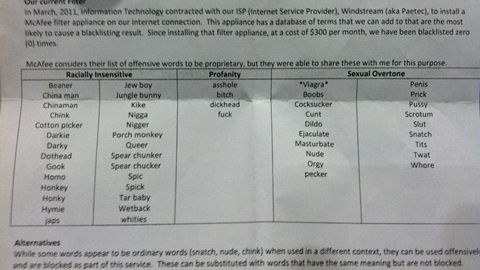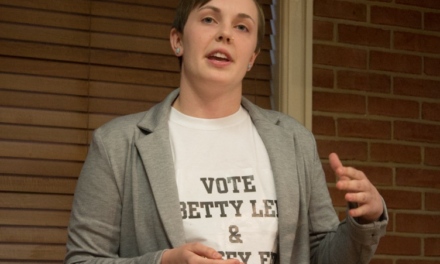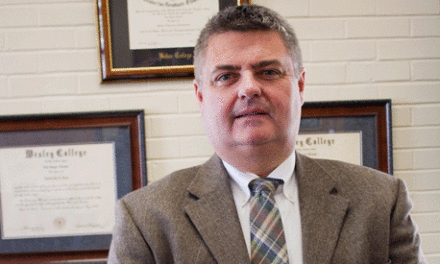By: Melissa Boyd (Whetstone Staff Writer)
Freshman Kayla Hodges was upset when she found out about the email content filter system that Wesley had instituted last year.
She said she doesn’t think there should be an automatic content filter that regulates emails.
“Most curse words should be filtered,†she said. “But some curse words, if not used excessively, should be allowed to fully express how discontented a student is or might just accurately state how the student felt or perceived something.â€
Dr. Mary Jo Benson, an instructor of mathematics, said she thinks problems with academic freedom arise from the content filter.
“Some cases might be problematic, like in the literature department,†she said. “Some literature passages might have derogatory language and that could cause a problem if a student needs to ask a professor a question about it. Email is the most used out-of-class conversation between students and professors, and students should be able to converse freely.â€
The Student Affairs committee at Wesley, which includes Dr. Angela D’Antonio, met with Jody Sweeney, head of the IT department, to discuss the problems with the filtration system, which automatically blocks emails containing “inappropriate words†arbitrarily chosen by an Internet filter service come called McAfee.  Emails that contain the words are sent back to the recipient with a Mailer Daemon.
D’Antonio said her main concern with the filter system is the principle that an independent company is deciding how students and faculty communicate.
Wesley is paying $300 a month for the service.
“It makes me question what’s going on with an industry that focuses on ‘helping people’ by filtering,†she said. “It’s not that we want to send curses, but it’s the principle of it. It raises the question of who gets to decide what words are appropriate or inappropriate and with what forethought and wisdom.â€
Matthew Montgomery, the network and system administrator at Wesley, said the college needed a filtering system for emails because of continual blacklisting.
“We used to get blacklisted on almost a weekly basis,†he said. “That means that we can’t send or receive off-campus emails.â€
Blacklisting happens when a high amount of “inappropriate†emails are sent or received.
Every piece of email is given a spam score, based on content, he said. If they’re flagged with a high score, the email filter takes action. The higher the score, the more likely the email is to be bounced back. As an institution, he said, Wesley needs lower spam scores to build a good reputation, therefore not getting blacklisted. When the college is blacklisted, students, faculty and staff members are not able to send or receive emails from anyone not in the Wesley email system.
“We haven’t once been blacklisted since the new filtering system kicked in,†he said.
Montgomery said that student-to-student emails are unfiltered by IT, whereas those that are sent or received by faculty and staff are.
“Faculty and staff mailboxes are housed on Wesley campus servers and are protected by the mail filter,†he said, “whereas student mailboxes are housed on Microsoft’s servers. I would imagine they have some protection, but we [Wesley IT] don’t control that.â€
He said that he hasn’t received a lot of feedback from staff, faculty or students.
“Most people don’t even know it’s there,†he said.
An anonymous source provided The Whetstone with the list of the words McAfee has deemed “inappropriate.â€
The content filter blocks not only selected racial slurs, profane words and sexual terms, but also any information with personal identity (credit card or social security numbers, for example), viruses and known “Spam†(like unusual recipients: from the president of Nigeria, etc).
Walt Beaupre, director of safety and security at Wesley, is the only person on campus exempt from some of the blocked content.
“I’m responsible for reporting the facts,†he said. “Sometimes those facts can only be sent through email.â€
He said that, so far, he hasn’t received any emails that he wished had been bounced back, but he thinks it’s a necessary part of his job to have uncensored emails.
“If someone is sending me information concerning a complaint, it’s important to have the facts,†he said. “At times, that contains racially insensitive terms or slurs, sexually-explicit material and profanity.â€
           Dr. Susan Cooper, a professor of education, said she opposes censorship of all forms, including filtering the content in the email system, but students should be responsible enough to be respectful.
“I am not afraid of words,†she said. “Freedom of speech is one of the greatest gifts we have in America.â€
Many professors were not aware of the content filter in their email system, including Dr. Jonathon Kidd, a full professor of biology.
“To my knowledge, it wasn’t communicated to faculty,†he said. “Nobody told us in writing this is going on and that leaves me empty. If we’re being watched over, they have an obligation to tell us.â€
Kidd said he opposes censorship of all forms, but that his biggest problem was not being informed prior.
“Why should I learn about this from The Whetstone and not from a group of people who are supposed to facilitate teaching learning processes?†he said. “Who decided this and why aren’t they brave enough to tell us?â€
Kidd said that he thinks people will focus on figuring out how to overcome the content filter.
“What they’ve done is set up the system so people want to beat it,†he said. “You can’t have it, so people want it. There’s always a way around the system. If someone wants to curse someone out, leave out the spaces and send it anyway. If someone wants to send an email with a social security card number, send it in code. There’s always a way out and people are just going to try and beat the system.â€
Senior Lauren DeVore said she thinks the email content filtering system should be used on campuses to enforce appropriate, professional language that students should use when speaking to professors or other staff members.
“I think student censorship is a positive thing,†she said. “In a situation like sending an email to a professor, there should be a certain way to address those professors respectfully.â€
D’Antonio said the college is currently looking into other methods to stop being blacklisted but to not automatically filter emails.
“IT is looking into different types of servers, like Gmail or yahoo,†she said. “That way, we’re not labeled as an institution so we wouldn’t get blacklisted for any content. It would also be more cost-effective.â€





